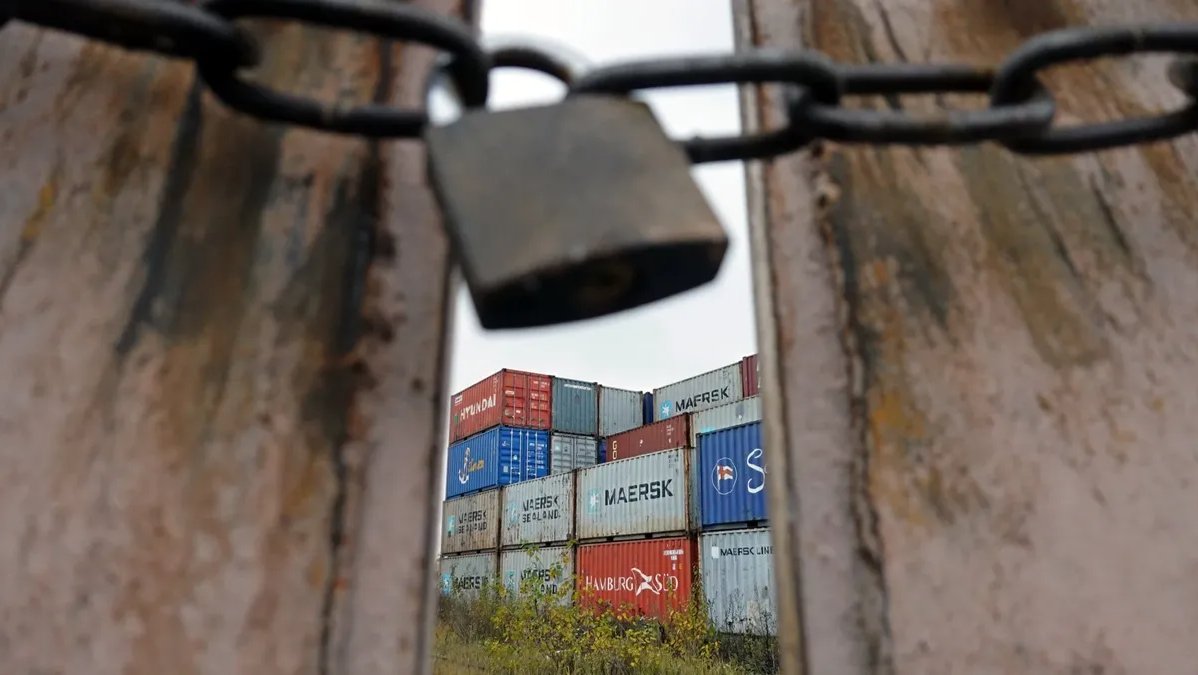Various sanctions have been imposed against Russia in the past eight months. Meanwhile, the EU spends about three times as much money on Russia’s energy commodities than on aid to Ukraine. Moreover, the Western countries are stepping up imports of Russia’s metals while the US authorities ask domestic banks to keep on working with Russian companies.
Does this mean that the West is being inconsistent and is backing out when it comes to sanctions? Can those who trade with Russia be blamed for sponsoring the war against Ukraine? And why does the world find it so hard to cut all ties with Russia? These are the questions we discussed with Sergey Aleksashenko, an economist.
Bloomberg reported in November that the US authorities had asked those domestic banks that show too much vigilance not to stop working with Russian companies not under sanctions. This includes Gazprom, fertilisers suppliers, and so on. Why did they intervene?

Sergey Aleksashenko
Russian economist, PhD in Economics
The first thing worth noticing: as you said, the companies in question are not under sanctions. Therefore, US companies have every right to work with them — or opt not to do so.
Putin said the West does not want Russia’s provisions to reach the world markets, he said it was the West who was provoking the food crisis and blamed it on Russia. Obviously, nobody wants to hear such accusations. I believe the US authorities have made this decision reacting to Putin’s statements.
The West’s obligation not to restrict the exports of Russia’s agricultural produce and fertilisers is said to be part of the agreement between Russia, Turkey, and the UN on Ukrainian grain exports. So, there is nothing surprising about this.
Moreover, if Russia is world’s biggest, or second biggest, exporter of wheat, while its buyers are countries in Northern Africa and the Middle East, then the restrictions on payments for Russia’s wheat harm the poor countries. The US must take this into consideration. They hardly want to be reproached for poor countries starving because of the actions of the US banks. And they absolutely do not want anyone to say that the US banks act this way not because of the sanctions but because of some undisclosed instructions.
Are there any Russian companies the West would like to sanction but cannot do so? And do those companies still make money exporting goods?
Russia happens to be one of the biggest suppliers of raw materials for the world’s economy. Nobody can substitute Russia in this role. No country can replace Russia’s oil, nickel, palladium, fertilisers, wheat, and so on. Therefore, the exporters of oil and gas make most money. Rosneft, Gazprom, and Lukoil are the core elements of Russia’s exports. Norilsk Nickel [or Nornickel] is a company that owns 45% of the global reserves of palladium and 20% of the world’s nickel. And Rusal is another such company. These companies have no sanctions against them anymore.

The entrance to Rosneft Deutschland HQ, Behrenstraße, Germany. Photo: Jörg Carstensen / picture alliance / Getty Images
How important are these companies to Russia’s economy?
Norilsk Nickel and Rusal create thousands of hundreds of jobs in single industry towns such as Norilsk, a place that lives entirely off the local enterprise. If you stop its operation, a city with 250 thousand residents will become penniless.
How would giving up on Norilsk Nickel’s or Rusal’s products affect ordinary people in the West?
Aluminium is used to create cars and aeroplanes. Nickel is required to produce alloy steel. Those are basic industrial metals needed for all sorts of things from bridges and railways to vehicle engines. The Trump administration announced in 2018 that it would impose sanctions against Rusal in six weeks’ time and ban any commercial relations with it.
Two weeks later, the global aluminium prices increased by 20%. The US virtually cancelled its own decision eventually. So, the statement alone triggered a price hike.
There was news in September that the Western countries stepped up the imports of Russia’s aluminium and nickel by 70% between March and June. If they can’t give up buying it, why can’t they at least not ramp up the imports?
I believe this ramping up of imports was triggered by the rumours of potential sanctions. If sanctions were imposed against the likes of Rusal and Norilsk Nickel, the global market would experience long-term instability, and raw materials would be hard to purchase. To avoid this, they decided to stock it up just in case. I wouldn’t pay too much attention to this; the companies were just solving their issues. A company like Volkswagen which buys Russian palladium for its catalytic converters is not administered by Germany’s government and makes decisions based on its own commercial interest. I believe the German government learned about these rates by reading the news, too.
Why did it work out with an embargo against Venezuela and Iran then?
These two countries together produced more than twice as little oil as Russia. The reduction in the supply of Iranian and Venezuelan oil proceeded gradually, although Iran’s oil supplies declined more sharply. Iran’s state has been limited in terms of technology for many years, and their decline was also soft early on.
Russia is the world’s second oil producer after the US. America, however, consumes almost all the oil it extracts. If we look at the oil-producing countries and only count exports, excluding domestic consumption, we’ll see that Russia produces each one in six tonnes of oil in the world, petroleum products included. That’s the first place in the global leader board. If you remove 20% of the world’s oil from the market, the price for the remaining oil, petroleum, and diesel will increase many-fold. This will be a huge blow to the entire world economy.
Therefore, nobody wants this to happen. One of the most important rules of any sanctions policy is: the sanctions should not do your country more harm than they do to the target country.
If Russia’s oil disappears from the global markets, this will result in a prolonged worldwide recession for several years, and there are going to be tough times. It will primarily affect ordinary people through inflation. The excise duties for petroleum are not very high in the US, so overall price increase can be monitored through petroleum prices. If oil price increases five-fold, the petroleum price will also increase five-fold. The inflation rates are going to be 17-18% instead of the current 7-8%.
Novaya-Europe published its research recently on how Western companies are leaving the Russian market. Its conclusion was: many companies take their time or do not plan to leave at all. The notable examples are France’s Total and Auchan. Why did some companies not join the boycott, and why don’t their governments urge them to do so?
Why should they leave, and why should the governments urge them? Auchan does not violate any sanctions. What we call “Western companies leaving the Russian market” are voluntary decisions, or you may call it “moral sanctions.” Sanctions policy is what each government believes is right. Why companies are leaving [when nobody forces them to] is a different question.
Can business get back to usual with the Western companies?
It cannot while Putin is in charge, the more so as the core part of trade is power commodities, and Russia has already lost these markets. Russia is not considered a reliable supplier of power commodities anymore. Nothing is going to change about it just yet. It might change sooner or later as the geographic proximity allows for better economic ties.
Some say that when the West, China, or India are stepping up trade with Russia, they are virtually sponsoring the war. Can you agree with that?
One may use fancy newspaper-like phrases, saying that Putin’s economy sells resources to the outer world and uses this money for the war. Yes, this is true. But I’m not sure it would be right to say so. Using this logic, one is a sponsor of the war if they pay taxes in Russia. This is good for a newspaper, but it’s shallow talk to me. The entire global economy is interrelated. The West and the global economy in general cannot do with Russia’s raw materials. Therefore, they will keep buying those materials. You may accuse them of sponsoring the war if you like. But they care about the interests of their own countries, companies, and economy, and they do not wish an economic collapse.
Some renowned economists have said that the world may renounce the use of Russia’s power commodities immediately without any catastrophic consequences.
Yes, and the world did not heed what they said. And I said that this would be impossible from the very start. Nine months have passed, and we can see that the supplies of Russia’s oil have barely dwindled. This means that the global economy simply cannot do without it.
For instance,
when Europe stopped buying Russia’s plywood, the production of this commodity in Russia decreased by 20-30%. When Europe stopped buying potassium fertilisers from Russia, its production decreased by 40%.
So, we can see the effect when we deal with those Russian commodities Europe can do without. Those that they cannot do without show no effect.
Could secondary sanctions affect Russia’s trade with India and China?
Russia’s oil may be transported to Europe, India, or China by tankers. In terms of global economy, it’s unimportant where the tankers would sail to. India used to buy oil from Angola, and Europe used to buy oil off Russia, today’s it’s simply the other way around. Changing the order of addends does not change the sum.
The G7 is planning to implement an oil price cap, may this work?
The preferences that India and China have result in Russia’s oil being exported at a 25% discount compared to the Brent price without any price cap.
The cap that is being discussed is even lower.
There is no price cap yet, and we don’t know what it’s going to look like eventually. We cannot make any judgements on the matter so far.
Will Turkey, China, and other countries help Russia set up parallel imports?
Parallel imports allow to solve certain issues, but not all of them. It’s important to understand that parallel imports are imports of goods that are not banned from being supplied to Russia but are not available in Russia per manufacturers’ decision. For instance, Apple has decided that it would not officially supply its products to Russia. So, buying up iPhones or MacBooks via some mediators is what is called parallel imports. Turkey, India, and some other countries will make some money off that.
Russia may purchase, say, ten thousand iPhones through parallel imports, but it won’t be able to buy car assembly sets for all the car factories that have been closed in the country. For instance, AvtoVAZ will not be able to purchase assembly kits to produce Renault vehicles even though there is a Renault factory in Turkey. Parallel imports are similar to shuttle trade. It does not mean that they can import everything.

Photo: Contributor / Getty Images
Will parallel imports help import microchips used for military equipment?
Microchips are a commodity banned from being sold to Russia, so, it will be acquired by violating the sanctions. You may call this bypassing the sanctions.
What kind of additional restrictions may the West impose on Russia?
It may ban selling any goods or services for the interests of the oil sector, for instance. This may cover all products for the extraction or exploration of oil produced using European and American equipment or patents.
These wouldn’t be sensible restrictions, would they?
In my opinion, the core part of restrictions today is related to the ban on selling military and dual-use produce. The major sectors that are under sanctions are aircraft engines, civil aircraft, and expensive cars. But Russia still buys many other things from the West.
I find it very unlikely that any other industry might come to a complete halt. No sanctions in the world are capable of bringing an economy to a halt, no matter what country is in question: Russia, North Korea, Iran, or Uganda. Sanctions can have a more or less significant deterrent effect, but no sanctions exist that would stop an entire economy from working.
Join us in rebuilding Novaya Gazeta Europe
The Russian government has banned independent media. We were forced to leave our country in order to keep doing our job, telling our readers about what is going on Russia, Ukraine and Europe.
We will continue fighting against warfare and dictatorship. We believe that freedom of speech is the most efficient antidote against tyranny. Support us financially to help us fight for peace and freedom.
By clicking the Support button, you agree to the processing of your personal data.
To cancel a regular donation, please write to [email protected]

